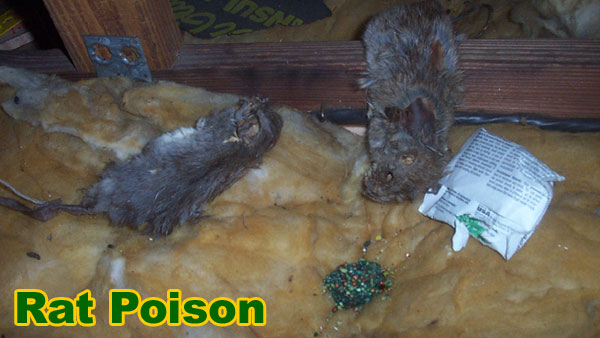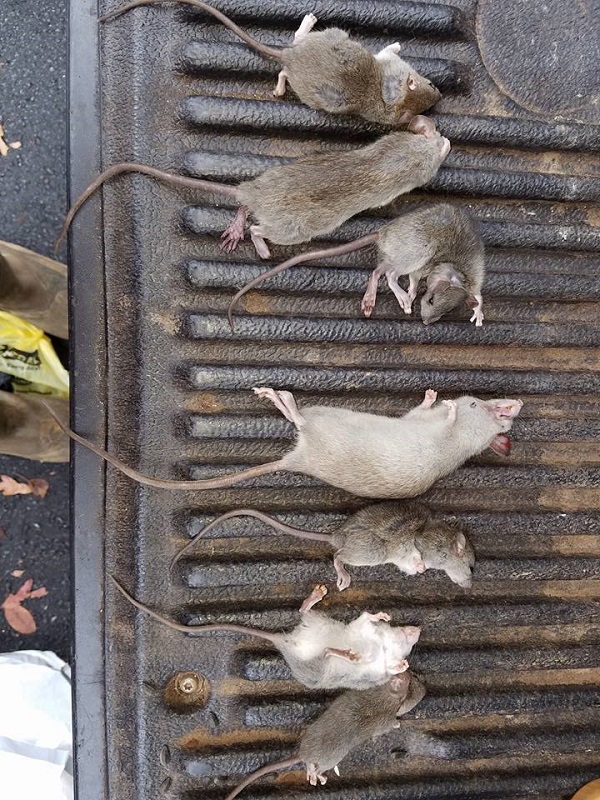I think the most important thing I have to say on this website is that mouse poison is a terrible approach to mouse control, for the following reasons:
- Poison doesn't kill all the mice - and the remaining ones reproduce quickly
- Those mice that do die, will die in the attic or walls, and rot and stink
- Poison is a very painful way to die, and is very inhumane
- Poison skips the most important part of the mouse control process - addressing the ROOT of the problem - the open holes in your house that allow mice inside! You must find these holes and seal them shut,
or you'll never solve a mouse problem.
 How Mice Poison Works
How Mice Poison Works
Very many people think that mice poisons choke the rats to death. While this is not entirely true, there are some few poison manufacturers who still insist on letting the mice and rats choke. However, here are some few ways in which the mice poisons drain the life out of mice and rats.
Anticoagulation
This is the process of inhibiting blood clotting in the mice. The doses can also destroy small blood vessels in the mice’s body leading to less blood flow to important areas of the body like the brain. Increasing the permeability of blood vessels and also causing internal body bleeding are some of the other functions of anticoagulants. The effects are gradual and cause death after some few days after ingestion. In the last hours of the mice’s’ life, they collapse from severe anemia, shock and internal bleeding. They often die painfully but silently. The anticoagulants require a high concentration to work and should thus be in repeated doses. Using too much poison on a single bait can be ineffective since the mice may sense the poison and refrain from munching on the bait. This means that the mice have to feed on the poison repeatedly for it to work.
Mental Phosphides
These poisons are single-dose rodenticides. The acid in the poisons is made in such a way that it reacts with the digestive system of the mice to produce phosphine acid that is toxic. The poisons are mainly made of Zinc Phosphide. The poisons are strong and have a weak pungent odor. These kinds of poisons can be used to kill both field and house mice. They work very quickly and kill the rats in a matter of days. The good news is that they are needed in low concentrations and thus one bite of the poisoned bait is enough to kill a mouse. They provide the highest chances of killing mice and rats.
Hypercalcemia
These poisons are made up of substances that are very toxic to rodents. When consumed, they cause a series or reaction that raises the vitamin and calcium, levels. Afterwards, calcium crystals are formed in the lungs, kidneys and blood vessels thus damaging these essential body parts. Capillary damage then follows causing massive internal bleeding and the end result is kidney failure. The mice die a very painful death after a few days of ingesting the poison. The poisons are also very fatal and kill the mice in low concentration. One single bite of these types of poisons is enough to kill a mouse.
There are certain poisonsthat are made up of combinations of two or more of the above poisons. Such poisons are very deadly and kill the mice after a few hours of ingestion
Go back to the
How to get rid of mice in the attic home page. You might also want to read about
how to kill mice and why the use
of snap traps is better than
mouse poison. Read an analysis of the different types of traps and how to use them on the
how to trap mice page.
Learn why
bait is not as important as trap type, placement and location. Also read a full analysis of
mouse repellent to understand why it
never works. If you see droppings and want to identify them, read the
mouse poop page. If you need to hire professional help, read about
how much does mouse removal cost?
or you can read this site to learn how to do it yourself. Feel free to email me about Should I ever poison a house mouse?
There are many millions of mice that live worldwide. The can live in both urban and suburban settings. They
can adapt to living inside or outside. They live to eat, chew, and procreate, and yet they have an important
place in our eco-system. Theses furry creatures are, by their nature, annoying, noisy, and intrusive. Even
though a mouse’s natural habits cause them to be destructive to your home there are a variety of established
ways to be rid of them that NEVER consist of poisoning. While you might think that poison is a simple solution,
you could not be more wrong. Here are some reasons why. The majority of rodent poisons you cans buy on the market
today contain overly hazardous chemicals like bromethaline and warfarin. Bromethalin is a high grade neurotoxin that
causes feebleness, paralysis, internal and cerebral hemorrhaging. Warfarin is a serious anticoagulant that keeps the
blood from clotting in mammals.

Both These toxins, usually disguised in flavored blocks or pellets, are designed to be highly attractive to rats and mice.
Unfortunately these poisons can also be attractive to other animals, pets, and small children. These are both highly toxic
to humans and domestic animals. If you are trying to rid your home of mice it is potentially a waste of time and money to lay
out poison. If you do poison mice in your home, you now run the risk of not finding the carcass (es). This creates a large
number of problems. Even though it is small, a corpse as tiny as that of a mouse can create a terrible stench while rotting
in your walls or attic. This odor will in turn attract bugs and carrion feeders who will present their own set of problems. A
mouse, rotting from poisoning in your walls can cause health and safety issues.
It can endanger your home, family, and even your pets. If mice die in your yard this creates another set of problems. The mouse
carcass could be found by one of your pets, or by a bird of prey or any other wild animal that will most likely be poisoned form
eating it. Poison lying about your home or yard poses a danger to other types of wildlife and domestic animals who might happen
upon it and eat it. Noted environmentalists have further agreed that many of the toxins from these poisons can leach into our
water table and pose a threat to our eco-system. Allowing them to leach in to gardens that grow food is also dangerous because
of residual poisoning. There are many different ways to rid your home and property of these pests. Poison does not have to be the
solution. Live traps, animal’s control, and natural means all exist to help with your infestation. Consult your local agricultural
agency, wildlife handler, or a pest control service for help. Don’t endanger yourself, your pets, your world, or others by turning
to poisons to rid your home of mice.